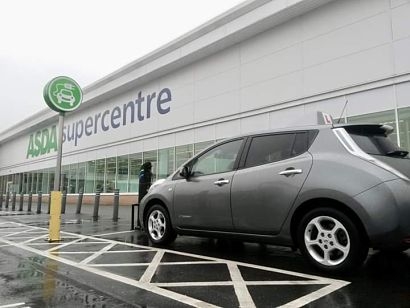
542 EV charger units were installed by supermarkets from the end of October 2017 to the end of 2019, taking the total on their sites to 1,115 – a growth of 95 percent. The number of stores offering charging facilities has also doubled with 608 supermarket sites now catering for battery electric and plug-in hybrid vehicles which equates to 5 percent of all supermarkets – while this appears low it is no doubt in part due to a considerable proportion of smaller supermarket sites not having car parks. Between 2017 and 2019, 313 stores added chargers with, on average, two charging units being installed per site.
The RAC and Zap-Map have both long advocated the importance of supermarkets offering customers charging facilities due to the fact that customers spend 45 minutes on average in their stores – a more than reasonable amount of time to top up an electric car.
When looking at each supermarket’s store portfolios Asda has the greatest proportion of locations where an EV can be charged – 122 of its 633 sites (19 percent). Morrisons is in second spot with EV charging available at 89 of its 494 stores (18 percent), while Waitrose comes in third place with 14 percent – 49 of 349 stores.
While Tesco currently only has 4 percent of stores with charging capability, it has highest total number of stores with charging facilities (142 of 3,961 stores). It should also be pointed out that many supermarket chains particularly Tesco, Sainsbury’s, Iceland and Co-op have stores in city or town centre locations which do not have car parks, therefore skewing the ‘charge point by store’ percentage significantly.
Not only does Tesco have the most stores with charging facilities, it is also the supermarket brand that has increased the number of charge points the most between 2017 and 2019, adding 258 to take its total to 281 by the end of 2019 – this means a quarter (25 percent) of all supermarket charge points are at Tesco. Asda has 228 charging units, but it only installed eight in the two years from 2017 (3 percent increase) – this means it has a fifth (20 percent) of all supermarket charge points.
Morrisons, Co-op, Lidl and Aldi have all also seen double-digit growth. Morrisons installed 83 charge points giving it 143 in total, Co-op 68 (88 in total), Lidl 48 (76 in total), Aldi 40 (72 in total), and Sainsbury’s 27, making for a total of 139 chargers.
Currently, 15 percent of supermarket charge points are capable of faster charging known as ‘rapid charging’. Morrisons leads the way here with 84 rapid chargers, making for 59 percent of its total number of chargers. Lidl is second with 63 percent of its 76 units (48) equipped with rapid charging. Co-op is in third with 18 percent of 88 chargers (16) capable of delivering its EV-owning customers with a rapid charge. Asda and Tesco which dominate EV charging generally at supermarkets are lagging behind in the rapid stakes with one and two chargers respectively.
“It is very encouraging to see supermarkets increasingly embracing electric vehicle charging at their stores with a dramatic shift in the number of chargers being installed over the course of the last two years” said Melanie Shufflebotham, co-founder of the UK’s leading charging point platform Zap-Map. “Our research shows that while the majority of charging is done at home, most EV drivers use the public network more than once a month. While a robust rapid infrastructure across the country is essential for longer journeys, having charge points in supermarkets provides EV drivers an excellent way to ‘graze‘ energy while doing an everyday task. With 89 percent of EV drivers taking the availability of charge points into account when selecting their parking, providing charging can be a real differentiator locally in the competitive supermarket sector. This seems to be recognised by some supermarkets, notably Tesco and Sainsbury’s, providing EV charging for free.”
RAC spokesman Simon Williams added that it is extremely positive to see the supermarkets making it easy for drivers to go electric and that having more chargers that are readily available will help to speed up the transition from petrol and diesel cars to electric ones.
Research conducted for the RAC Report on Motoring shows the number of drivers who say they will choose an electric car as their next vehicle has doubled with 6 percent of motorists – the equivalent of more than 2.5m drivers – saying they intend to buy a pure electric battery-powered car when their existing vehicle needs to be replaced, compared to 12 months ago.
Car industry data shows there are now more than 100,000 battery electric vehicles (BEV) on the UK’s roads and more than 170,000 plug-in hybrids.
The RAC is leading the way in EV roadside assistance by offering drivers complete peace of mind via its EV Boost mobile charging units which give a top-up to out-of-charge vehicles. It has also developed the All-Wheels-Up recovery system which is deployed from the back of a standard RAC van to provide the equivalent of flatbed recovery, thereby enabling patrols to tow broken-down EVs which could not otherwise be towed on two wheels.
For additional information:

